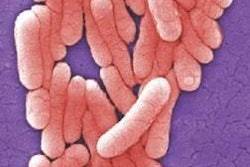China's poultry industry entered 2009 facing more stringent inspection and greater regulation, introduced in response to the various quality concerns that have emerged and damaged its reputation.
The country faces a variety of safety issues and obstacles, exacerbated by the fact that production is small scale with insufficient resources. This poses a long-term challenge. However, there are also issues that are an immediate problem, which are being tackled by the public and private sectors.
Melamine contamination, for example, greatly hurt sales of eggs and chickens in China last year, with prices falling 30% in one week alone.
During the second half of the year, Hong Kong's Center for Food Safety, the area's supervision authority, reported melamine in eggs from Dalian and Jingshan. Mainland China also uncovered contamination cases. In October, it discovered melamine in eggs from a Shanxi company.
The revelation resulted in egg prices falling sharply in 21 provinces, with declines reaching 1.3-19% per day during the worst of the crisis, the country's Ministry of Agriculture reported in October.
However, the impact was not restricted to the egg industry. Chicken producers bought fewer breeders as a result of falling demand for eggs and chicken meat. Consequently, the price of breeders fell from Yuan 2.9 (42 cents) to Yuan 1 per bird in only one week, notes Ding Pin, analyst at Haitong Securities Co. Ltd.
With reports that the egg contamination came about as a result of contaminated feed, and a consequent stepping up in feed inspections, prices for eggs began to rise in November. However, a number of analysts believe that the concerns that emerged over food safety will remain for a long time.
But beyond feed contamination, Chinese producers have other issues that need to be addressed. Guo Huiyong, an analyst with Beijing's Orient Agribusiness Consultant Co. Ltd., notes that producers not only have to confront the possible threat of avian influenza but must also face up to drug residues, withdrawing drugs in sufficient time before birds are sent to slaughter.
Problem of small-scale production
Small-scale producers dominate the Chinese egg and poultry industries, and producers with less than 3,000 birds account for 80% of the whole egg market. Their small scale makes adhering to safety standards difficult and impedes government efforts to raise quality.
"The structure of chicken production greatly affects product quality," commented Chen Jianhua, spokesman for Fuzhou-based Fujian Sunner Development Co. Ltd. "Compared with widespread small producers, prevention, containment and culling programmes can be carried out more effectively in large operations."
One way that Sunner, a supplier to KFC, reduces risk is by ensuring that its chicken farmers usually childless couples do not leave their farms during the critical 45 days that chickens are raised. This requirement is not unusual in China, where farms tend to be packed closely together.
"Due to the high population density in the country, it is difficult for Chinese producers to put their chicken farms in isolated areas," explained Liu Shaobo, a professor at Beijing's China Agricultural University. "It would be easier to prevent the spread of diseases if chicken farmers can stay in restricted areas."
Liu also added that large operations are better placed than small famers to control avian influenza.
Lack of government support
Small-scale producers, without government support, lack the necessary resources to invest in inspection equipment.
Illustrative of the problems that this lack of resources and lack of control can cause is that Jingshan Pengchang Agricultural Products Co Ltd was named in October last year as having exported contaminated eggs to Hong Kong.
Pan Fengxia, general manager with Hubei's Jingshan Pengchang Agricultural Products Co. Ltd., explains: "When I buy eggs from my contracted farmers, I only check whether there are any broken eggs. My small company does not have enough money to buy expensive inspection equipment. Sometimes, I cannot make a profit after paying government inspection fees."
If the government were to offer subsidies to poultry slaughterhouses, along the lines of what had previously been offered to pig slaughterhouses, unsafe poultry would be kept off the market, argues Bi Yingzuo, professor at Guangzhou's South China Agricultural University.
"The government provided Yuan 500 for each 90kg of pig weight to the slaughterhouse to dispose of unsafe meat but chicken slaughterhouses do not yet enjoy this subsidy," Bi added. "This is because chicken meat is not as important as pork, which is the traditional favourite meat in China."
Despite this lack of finance, the government, together with producers, has started to increase efforts to ensure higher quality. Inspections have become stricter in the meat, egg and related industries.
"The authorities have inspected 250,400 feed factories and destroyed 3,682 metric tons of off-grade feed since September 2008," veterinarian Ding Kangzhen said at the 10th National Feed Additives Congress in December. "During the second half of 2008, feed tested clear of melamine in 97% of 22,700 samples, an increase of 3.5% compared with the first half of 2008."
Also in December, the Ministry of Agriculture implemented revised standards for feed, replacing regulations published in 2006. The updated rules give more specific detail on enzyme usage. In January, the central government resumed quality inspection of egg producers across five provinces.
Producers have also been taking their own initiatives to raise quality. For example, Dalian-based Hanwei Group Co. Ltd. recently announced that it had purchased specialist equipment for the detection of melamine in chicken feed, as the substance had been found in eggs that they had exported to Hong Kong.
















